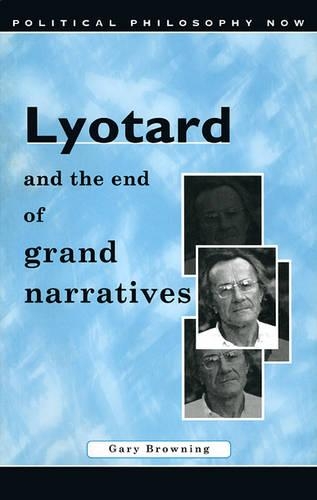
Lyotard and the End of Grand Narratives
(Paperback)
Available Formats
Publishing Details
Lyotard and the End of Grand Narratives
By (Author) Gary Browning
University of Wales Press
University of Wales Press
1st September 2000
United Kingdom
Classifications
Tertiary Education
Non Fiction
Philosophical traditions and schools of thought
194
Physical Properties
Paperback
192
Width 138mm, Height 216mm
313g
Description
Jean-Francois Lyotard is generally acknowledged as the theoretical spokesperson for postmodernism. In 1979, his seminal work The Postmodern Condition challenged the presumption and orientation of modern political philosophy. In particular, Lyotard repudiated the notion of grand narratives and promoted a postmodern acceptance of difference and variety and a scepticism towards unifying metatheories. Yet The Postmodern Condition is just one work by a prolific author whose life and work involved close theoretical engagement with Kant, Hegel and Marx and who played a prominent role in the events in Paris of May 1968. This study combines a careful reading of Lyotard's texts with a critical review of his theoretical ploys to demonstrate the incapacity of theory. Lyotard's variety of styles, ranging from the incandescent Libidinal Economy to the economical lucidity of The Differend, are recognized as posing questions for those who defend the rationality of the status quo and for those who undertake general critiques of society. In this book, Gary Browning takes issue with Lyotard's approach to Hegel and Marx and his generalized notion of social development as proceeding according to a one-dimensional, instrumentalist logic. Nevertheless, Lyotard is shown to be a disturbing theorist who challenged the assumptions of classic theorists of modernity as well as opposing mainstream attitudes prevalent in contemporary political theory.
Reviews
' ... Browning presents accessible accounts of both Lyotard's positions and the critical responses they engendered that are not unduly burdened by jargon ... Lyotard's originality and ingenuity is fully and critically appreciated by Gary Browning, who maintains a stance of sympathetic but critical detachment throughout this study. His reservations are clearly expounded and justified, and the book as a whole offers an integrated and persuasive account of how Lyotard's repudiation of generalising explanatory approaches was itself inflected by that mode of thought, but is also attentive to the significance of his contributions to the development of theorising after structuralism.' (Poststructualism and Radical Politics Newsletter) 'Those...who are looking for a clear and somewhat detached reconstruction of the strong critical and agonistic aspects of Lyotard's (political) philosophy, will surely like this beautiful and well presented book.' Tijdschrift voor filosofie
Author Bio
Gary Browning is Professor of Politics at Oxford Brookes University.
